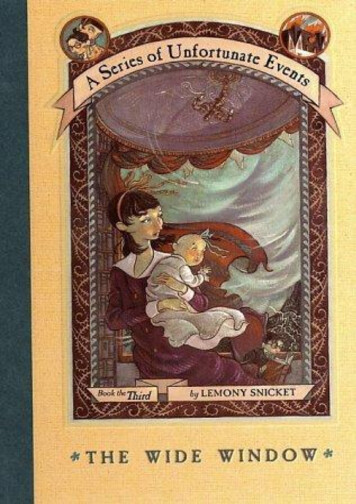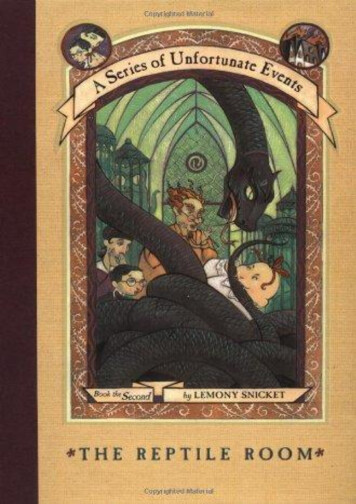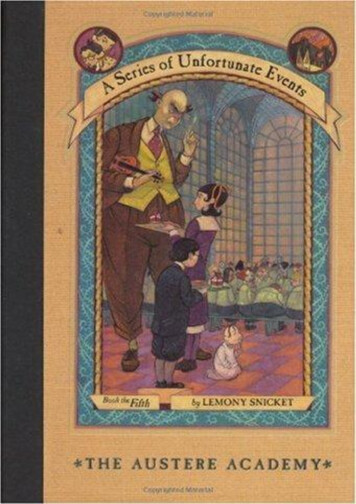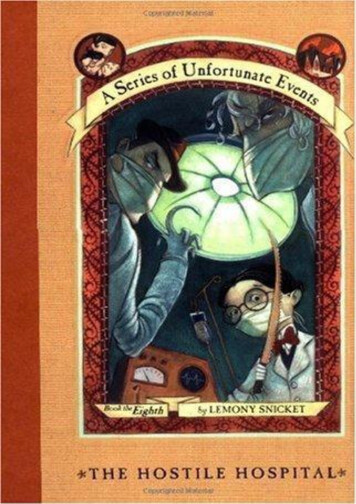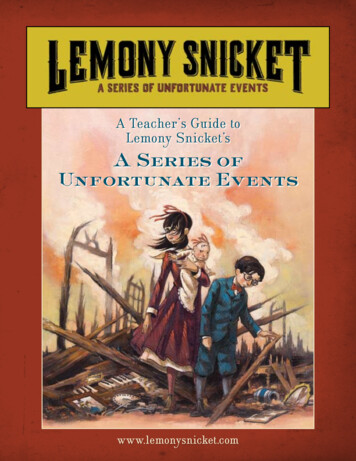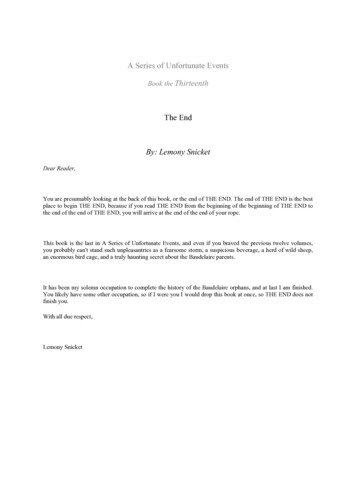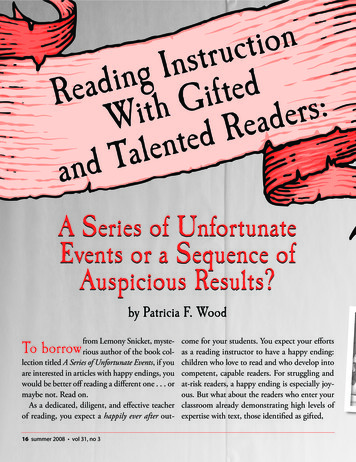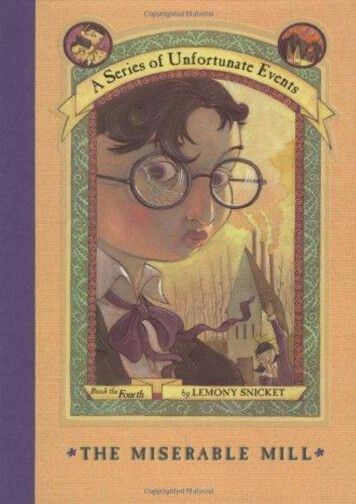
Transcription
A Series of Unfortunate Events 4 - TheMiserable MillASeriesofUnfortunateEventsA Series of Unfortunate EventsBook the FourthThe Miserable MillLemony SnicketTo BeatriceMy love flew like a butterflyUntil death swooped down like a batAs the poet Emma Montana McElroy said:“That’s the end of that.”CHAPTEROneSometime during your life-in fact, very soon-you may find yourself reading abook, and you may notice that a book’s first sentence can often tell you what sort ofstory your book contains. For instance, a book that began with the sentence “Onceupon a time there was a family of cunning little chipmunks who lived in a hollowtree” would probably contain a story full of talking animals who get into all sorts of
mischief. A book that began with the sentence “Emily sat down and looked at thestack of blueberry pancakes her mother had prepared for her, but she was too nervousabout Camp Timbertops to eat a bite” would probably contain a story full of gigglygirls who have a grand old time. And a book that began with the sentence “Garysmelled the leather of his brand-new catcher’s mitt and waited impatiently for hisbest friend Larry to come around the corner” would probably contain a story full ofsweaty boys who win some sort of trophy. And if you liked mischief, a grand oldtime, or trophies, you would know which book to read, and you could throw the restof them away.But this book begins with the sentence “The Baudelaire orphans looked out thegrimy window of the train and gazed at the gloomy blackness of the Finite Forest,wondering if their lives would ever get any better,” and you should be able to tell thatthe story that follows will be very different from the story of Gary or Emily or thefamily of cunning little chipmunks. And this is for the simple reason that the lives ofViolet, Klaus, and Sunny Baudelaire are very different from most people’s lives, withthe main difference being the amount of unhappiness, horror, and despair. The threechildren have no time to get into all sorts of mischief, because misery follows themwherever they go. They have not had a grand old time since their parents died in aterrible fire. And the only trophy they would win would be some sort of First Prizefor Wretchedness. It is atrociously unfair, of course, that the Baudelaires have somany troubles, but that is the way the story goes. So now that I’ve told you that thefirst sentence will be “The Baudelaire orphans looked out the grimy window of thetrain and gazed at the gloomy blackness of the Finite Forest, wondering if their liveswould ever get any better,” if you wish to avoid an unpleasant story you had best putthis book down.The Baudelaire orphans looked out the grimy window of the train and gazed at thegloomy blackness of the Finite Forest , wondering if their lives would ever get anybetter. An announcement over a crackly loudspeaker had just told them that in a fewminutes they would arrive in the town of Paltryville , where their new caretaker lived,and they couldn’t help wondering who in the world would want to live in such darkand eerie countryside. Violet, who was fourteen and the eldest Baudelaire, looked outat the trees of the forest, which were very tall and had practically no branches, sothey looked almost like metal pipes instead of trees. Violet was an inventor, and wasalways designing machines and devices in her head, with her hair tied up in a ribbonto help her think, and as she gazed out at the trees she began work on a mechanismthat would allow you to climb to the top of any tree, even if it were completely bare.Klaus, who was twelve, looked down at the forest floor, which was covered in brown,patchy moss. Klaus liked to read more than anything else, and he tried to rememberwhat he had read about Paltryville mosses and whether any of them were edible. AndSunny, who was just an infant, looked out at the smoky gray sky that hung over theforest like a damp sweater. Sunny had four sharp teeth, and biting things with themwas what interested her most, and she was eager to see what there was available tobite in the area. But even as Violet began planning her invention, and Klaus thoughtof his moss research, and Sunny opened and closed her mouth as a prebiting exercise,the Finite Forest looked so uninspiring that they couldn’t help wondering if their new
home would really be a pleasant one.“What a lovely forest!” Mr. Poe remarked, and coughed into a white handkerchief.Mr. Poe was a banker who had been in charge of managing the Baudelaire affairssince the fire, and I must tell you that he was not doing a very good job’ His twomain duties were finding the orphans a good home and protecting the enormousfortune that the children’s parents had left behind, and so far each home had been acatastrophe, a word which here means “an utter disaster involving tragedy, deception,and Count Olaf.” Count Olaf was a terrible man who wanted the Baudelaire fortunefor himself, and tried every disgusting scheme he could think of to steal it. Time aftertime he had come very close to succeeding, and time after time the Baudelaireorphans had revealed his plan, and time after time he had escaped-and all Mr. Poehad ever done was cough. Now he was accompanying the children to Paltryville, andit pains me to tell you that once again Count Olaf would appear with yet anotherdisgusting scheme, and that Mr. Poe would once again fail to do anything evenremotely helpful. “What a lovely forest!” Mr. Poe said again, when he was donecoughing. “I think you children will have a good home here. I hope you do, anyway,because I’ve just received a promotion at Mulctuary Money Management. I’m nowthe Vice President in Charge of Coins, and from now on I will be busier than ever. Ifanything goes wrong with you here, I will have to send you to boarding school until Ihave time to find you another home, so please be on your best behavior.”“Of course, Mr. Poe,” Violet said, not adding that she and her siblings had alwaysbeen on their best behavior but that it hadn’t done them any good.“What is our new caretaker’s name?” Klaus asked. “You haven’t told us.”Mr. Poe took a piece of paper out of his pocket and squinted at it. “His name is Mr.Wuz- Mr. Qui- I can’t pronounce it. It’s very long and complicated.”“Can I see?” Klaus asked. “Maybe I can figure out how to pronounce it.”“No, no,” Mr. Poe said, putting the paper away. “If it’s too complicated for anadult, it’s much too complicated for a child.”“Ghand!” Sunny shrieked. Like many infants, Sunny spoke mostly in sounds thatwere often difficult to translate. This time she probably meant something like “ButKlaus reads many complicated books!”“He’ll tell you what to call him,” Mr. Poe continued, as if Sunny had not spoken.“You’ll find him at the main office of the Lucky Smells Lumbermill, which I’m toldis a short walk from the train station.”“Aren’t you coming with us?” Violet asked.“No,” Mr. Poe said, and coughed again into his handkerchief. “The train only stopsat Paltry-ville once a day, so if I got off the train I would have to stay overnight andI’d miss another day at the bank. I’m just dropping you off here and heading rightback into the city.”The Baudelaire orphans looked worriedly out the window. They weren’t veryhappy about just being dropped off in a strange place, as if they were a pizza being
delivered instead of three children all alone in the world.“What if Count Olaf shows up?” Klaus asked quietly. “He swore he’d find usagain.”“I have given Mr. Bek- Mr. Duy- I have given your new caretaker a completedescription of Count Olaf,” said Mr. Poe. “So if by some stretch of the imaginationhe shows up in Paltryville, Mr. Sho- Mr. Gek- will notify the authorities.”“But Count Olaf is always in disguise,” Violet pointed out. “It’s often difficult torecognize him. Just about the only way you can tell it’s him is if you see that tattoo ofan eye that he has on his ankle.”“I included the tattoo in my description,” Mr. Poe said impatiently.“But what about Count Olaf’s assistants?” Klaus asked. “He usually brings at leastone of them with him, to help out with his treachery.”“I described all of them to Mr.- I have described all of them to the owner of themill,” Mr. Poe said, holding a finger up as he counted off Olaf’s horrible associates.“The hook-handed man. The bald man with the long nose. Two women with whitepowder all over their faces. And that rather chubby one who looks like neither a mannor a woman. Your new guardian is aware of them all, and if there’s any problem,remember you can always contact me or any of my associates at Mulctuary MoneyManagement.”“Casca,” Sunny said glumly. She probably meant something like “That’s not veryreassuring,” but nobody heard her over the sound of the train whistle as they arrivedat Paltryville Station.“Here we are,” Mr. Poe said, and before the children knew it they were standing inthe station, watching the train pull away into the dark trees of the Finite Forest . Theclattering noise of the train engine got softer and softer as the train raced out of sight,and soon the three siblings were all alone indeed.“Well,” Violet said, picking up the small bag that contained the children’s fewclothes, “let’s find the Lucky Smells Lumbermill. Then we can meet our newcaretaker.”“Or at least learn his name,” Klaus said glumly, and took Sunny’s hand.If you are ever planning a vacation, you may find it useful to acquire a guidebook,which is a book listing interesting and pleasant places to visit and giving helpful hintsabout what to do when you arrive. Paltryville is not listed in any guidebook, and asthe Baudelaire orphans trudged down Paltryville’s one street, they instantly saw why.There were a few small shops on either side of the street, but none of them had anywindows. There was a post office, but instead of a flag flying from the flagpole, therewas only an old shoe dangling from the top of it, and across from the post office wasa high wooden wall that ran all the way to the end of the street. In the middle of thewall was a tall gate, also made of wood, with the words “Lucky Smells Lumbermill”written on it in letters that looked rough and slimy. Alongside the sidewalk, where arow of trees might have been, were towering stacks of old newspapers instead. In
short, everything that might make a town interesting or pleasant had been madeboring or unpleasant, and if Paltryville had been listed in a guidebook the onlyhelpful hint about what to do when you got there would be: “Leave.” But the threeyoungsters couldn’t leave, of course, and with a sigh Violet led her younger siblingsto the wooden gate. She was about to knock when Klaus touched her on the shoulderand said, “Look.”“I know,” she said. Violet thought he was talking about the letters spelling out“Lucky Smells Lumbermill.” Now that they were standing at the gate, the childrencould see why the letters looked rough and slimy: they were made out of wads andwads of chewed-up gum, just stuck on the gate in the shapes of letters. Other than asign I saw once that said “Beware” in letters made of dead monkeys, the “LuckySmells Lumbermill” sign was the most disgusting sign on earth, and Violet thoughther brother was pointing that out. But when she turned to agree with him, she saw hewasn’t looking at the sign, but down to the far end of the street.“Look,” Klaus said again, but Violet had already seen what he was looking at. Thetwo of them stood there without speaking a word, staring hard at the building at theend of Paltryville’s one street. Sunny had been examining some of the teeth marks inthe gum, but when her siblings fell silent she looked up and saw it, too. For a fewseconds the Baudelaire orphans just looked.“It must be a coincidence,” Violet said, after a long pause.“Of course,” Klaus said nervously, “a coincidence.”“Varni,” Sunny agreed, but she didn’t believe it. None of the orphans did. Nowthat the children had reached the mill, they could see another building, at the far endof the street. Like the other buildings in town, it had no windows, just a round door inthe center. But it was the way the building was shaped, and how it was painted, thatmade the Baudelaires stare. The building was a sort of oval shape, with curved,skinny sticks sticking out of the top of it. Most of the oval was painted a brownishcolor, with a big circle of white inside the oval, and a smaller circle of green insidethe white circle, and some little black steps led to a little round door that was paintedblack, so it looked like an even smaller circle inside the green one. The building hadbeen made to look like an eye.The three children looked at one another, and then at the building, and then at eachother again, shaking their heads. Try as they might, they just couldn’t believe it was acoincidence that the town in which they were to live had a building that looked justlike the tattoo of Count Olaf.CHAPTERTwoIt is much, much worse to receive bad news through the written word than bysomebody simply telling you, and I’m sure you understand why. When somebody
simply tells you bad news, you hear it once, and that’s the end of it. But when badnews is written down, whether in a letter or a newspaper or on your arm in felt tippen, each time you read it, you feel as if you are receiving the news again and again.For instance, I once loved a woman, who for various reasons could not marry me. Ifshe had simply told me in person, I would have been very sad, of course, buteventually it might have passed. However, she chose instead to write a two-hundredpage book, explaining every single detail of the bad news at great length, and insteadmy sadness has been of impossible depth. When the book was first brought to me, bya flock of carrier pigeons, I stayed up all night reading it, and I read it still, over andover, and it is as if my darling Beatrice is bringing me bad news every day and everynight of my life.The Baudelaire orphans knocked again and again on the wooden gate, taking carenot to hit the chewed-up gum letters with their knuckles, but nobody answered, and atlast they tried the gate themselves and found that it was unlocked. Behind the gatewas a large courtyard with a dirt floor, and on the dirt floor was an envelope with theword “Baudelaires” typed on the front. Klaus picked up the envelope and opened it,and inside was a note that read as follows:MemorandumTo: The Baudelaire OrphansFrom: Lucky Smells LumbermillSubject: Your ArrivalEnclosed you will find a map of the Lucky Smells Lumbermill, including thedormitory where the three of you will he staying, free of charge. Please report towork the following morning along with the other employees. The owner of LuckySmells Lumbermill expects you to be both assiduous and diligent.“What do those words mean, ‘assiduous’ and ‘diligent’?” Violet asked, peeringover Klaus’s shoulder.“‘Assiduous’ and ‘diligent’ both mean the same thing,” said Klaus, who knew lotsof impressive words from all the books he had read. “‘Hardworking.’”“But Mr. Poe didn’t say anything about working in the the lumbermill,” Violetsaid. “I thought we were just going to live here.”Klaus frowned at the hand-drawn map that was attached to the note with anotherwad of gum, “This map looks pretty easy to read,” he said. “The dormitory is straightahead, between the storage shed and the lumbermill itself.”Violet looked straight ahead and saw a gray windowless building on the other sideof the courtyard. “I don’t want to live,” she said, “between the storage shed and thelumbermill itself.”“It doesn’t sound like much fun,” Klaus admitted, “but you never know. The millmight have complicated machines, and you would find it interesting to study them.”“That’s true,” Violet said. “You never know. It might have some hard wood, and
Sunny would find it interesting to bite it.”“Snevi!” Sunny shrieked.“And there might be some interesting lumbermill manuals for me to read,” Klaussaid. “You never know.”“That’s right,” Violet said. “You never know. This might be a wonderful place tolive.”The three siblings looked at one another, and felt a little better. It is true, of course,that you never know. A new experience can be extremely pleasurable, or extremelyirritating, or somewhere in between, and you never know until you try it out. And asthe children began walking toward the gray, windowless building, they felt ready totry out their new home at the Lucky Smells Lumbermill, because you never know.But—and my heart aches as I tell you this—I always know. I know because I havebeen to the Lucky Smells Lumbermill, and learned of all the atrocious things thatbefell these poor orphans during the brief time they lived there. I know because Ihave talked to some of the people who were there at the time, and heard with my ownears the troublesome story of the children’s stay in Paltryville. And I know because Ihave written down all the details in order to convey to you, the reader, just howmiserable their experience was. I know, and this knowledge sits in my heart, heavy asa paperweight. I wish I could have been at the lumbermill when the Baudelaires werethere, because they didn’t know. I wish I could tell them what I know, as they walkedacross the courtyard, raising small clouds of dust with every step. They didn’t know,but I know and I wish they knew, if you know what I mean.When the Baudelaires reached the door of the gray building, Klaus took anotherlook at the map, nodded his head, and knocked. After a long pause, the door creakedopen and revealed a confused-looking man whose clothes were covered in sawdust.He stared at them for quite some time before speaking.“No one has knocked on this door,” he said finally, “for fourteen years.”Sometimes, when somebody says something so strange that you don’t know whatto say in return, it is best to just politely say “How do you do?”“How do you do?” Violet said politely. “I am Violet Baudelaire, and these are mysiblings, Klaus and Sunny.”The confused-looking man looked even more confused, and put his hands on hiships, brushing some of the sawdust off his shirt. “Are you sure you’re in the rightplace?” he asked.“I think so,” Klaus said. “This is the dormitory at the Lucky Smells Lumbermill,isn’t it?”“Yes,” the man said, “but we’re not allowed to have visitors.”“We’re not visitors,” Violet replied. “We’re going to live here.”The man scratched his head, and the Baude-laires watched as sawdust fell out ofhis messy gray hair. “You’re going to live here, at the Lucky Smells Lumbermill?”
“Cigarn!” Sunny shrieked, which meant “Look at this note!”Klaus gave the note to the man, who was careful not to touch the gum as he read itover. Then he looked down at the orphans with his tired, sawdust-sprinkled eyes.“You’re going to work here, too? Children, working in a lumber-mill is a verydifficult job. Trees have to be stripped of their bark and sawed into narrow strips tomake boards. The boards have to be tied together into stacks and loaded onto trucks. Imust tell you that the majority of people who work in the lumber business are grownups. But if the owner says you’re working here, I guess you’re working here. You’dbetter come inside.” The man opened the door further, and the Baudelaires steppedinside the dormitory. “My name’s Phil, by the way,” Phil said. “You can join us fordinner in a few minutes, but in the meantime I’ll give you a tour of the dormitory.”Phil led the youngsters into a large, dimly lit room filled with bunk beds, standing inrows and rows on a cement floor. Sitting or lying down on the bunks were anassortment of people, men and women, all of whom looked tired and all of whomwere covered in sawdust. They were sitting together in groups of four or five, playingcards, chatting quietly, or simply staring into space, and a few of them looked up withmild interest as the three siblings walked into the room. The whole place had a dampsmell, a smell rooms get when the windows have not been opened for quite sometime. Of course, in this case the windows had never been opened, because thereweren’t any windows, although the children could see that somebody had taken aballpoint pen and drawn a few windows on the gray cement walls. The windowdrawings somehow made the room even more pathetic, a word which here means“depressing and containing no windows,” and the Baudelaire orphans felt a lump intheir throats just looking at it.“This here is the room where we sleep,” Phil said. “There’s a bunk over there inthe far corner that you three can have. You can store your bag underneath the bed.Through that door is the bathroom and down that hallway over there is the kitchen.That’s pretty much the grand tour. Everyone, this is Violet, Klaus, and Sunny.They’re going to work here.”“But they’re children,” one of the women said. “I know,” Phil said. “But the ownersays they’re going to work here, so they’re going to work here.”“By the way,” Klaus said, “what is the owner’s name? Nobody has told us.”“I don’t know,” Phil said, stroking his dusty chin. “He hasn’t visited the dormitoryfor six years or so. Does anybody remember the owner’s name?”“I think it’s Mister something,” one of the men said.“You mean you never talk to him?” Violet asked.“We never even see him,” Phil said. “The owner lives in a house across from thestorage shed, and only comes to the lumbermill for special occasions. We see theforeman all the time, but never the owner.”“Teruca?” Sunny asked, which probably meant “What’s a foreman?”“A foreman,” Klaus explained, “is somebody who supervises workers. Is he nice,
Phil?”“He’s awful!” one of the other men said, and some of the others took up the cry.“He’s terrible!”“He’s disgusting!”“He’s revoltingl ”“He’s the worst foreman the world has ever seen!”“He is pretty bad,” Phil said to the Baude-laires. “The guy we used to have,Foreman Firstein, was O.K. But last week he stopped showing up. It was very odd.The man who replaced him, Foreman Flacutono, is very mean. You’ll stay on hisgood side if you know what’s good for you.”“He doesn’t have a good side,” a woman said.“Now, now,” Phil said. “Everything and everybody has a good side. Come on, let’shave our supper.”The Baudelaire orphans smiled at Phil, and followed the other employees of theLucky Smells Lumbermill into the kitchen, but they still had lumps in their throats asbig as the lumps in the beef casserole that they ate for supper. The children could tell,from Phil’s statement about everything and everybody having a good side, that hewas an optimist. “Optimist” is a word which here refers to a person, such as Phil,who thinks hopeful and pleasant thoughts about nearly everything. For instance, if anoptimist had his left arm chewed off by an alligator, he might say, in a pleasant andhopeful voice, “Well, this isn’t too bad. I don’t have my left arm anymore, but at leastnobody will ever ask me whether I am right-handed or left-handed,” but most of uswould say something more along the lines of “Aaaaah! My arm! My arm!”The Baudelaire orphans ate their damp casserole, and they tried to be optimistslike Phil, but try as they might, none of their thoughts turned out pleasant or hopeful.They thought of the bunk bed they would share, in the smelly room with windowsdrawn on the walls. They thought of doing hard work in the lumbermill, gettingsawdust all over them and being bossed around by Foreman Flacutono. They thoughtof the eye-shaped building outside the wooden gate. And most of all, they thought oftheir parents, their poor parents whom they missed so much and whom they wouldnever see again. They thought all through supper, and they thought while changinginto their pajamas, and they thought as Violet tossed and turned in the top bunk andKlaus and Sunny tossed and turned below her. They thought, as they did in thecourtyard, that you never know, and that their new home could still be a wonderfulone. But they could guess. And as the Lucky Smells employees snored around them,the children thought about all their unhappy circumstances, and began guessing. Theytossed and turned, and guessed and guessed, and by the time they fell asleep therewasn’t a single optimist in the Baudelaire bunk.holding a breakfast of hot tea and toast on a plate, you will know that your day will beO.K. And if you wake up to the sound of somebody banging two metal pots together, and
find yourself in a small bunk bed, with a nasty foreman standing in the doorway holdingno breakfast at all, you will know that your day will be horrid.You and I, of course, cannot be too surprised that the Baudelaire orphans’ first dayat the Lucky Smells Lumbermill was a horrid one. And the Baudelaires certainly didnot expect twittering birds or a butler, not after their dismaying arrival. But never intheir most uneasy dreams did they expect the cacophony—a word which here means“the sound of two metal pots being banged together by a nasty foreman standing inthe doorway holding no breakfast at all”— that awoke them.“Get up, you lazy, smelly things!” cried the foreman in an odd-sounding voice. Hespoke as if he were covering his mouth with his hands. “Time for work, everybody!There’s a new shipment of logs just waiting to be made into lumber!”The children sat up and rubbed their eyes. All around them, the employees of theLucky Smells Lumbermill were stretching and covering their ears at the sound of thepots. Phil, who was already up and making his bunk neatly, gave the Baudelaires atired smile.“Good morning, Baudelaires,” Phil said. “And good morning, Foreman Flacutono.May I introduce you to your three newest employees? Foreman Flacutono, this isViolet, Klaus, and Sunny Baudelaire.”“I heard we’d have some new workers,” the foreman said, dropping the pots to thefloor with a clatter, “but nobody told me they’d be midgets.”“We’re not midgets,” Violet explained. “We’re children.”“Children, midgets, what do I care?” Foreman Flacutono said in his muffled voice,walking over to the orphans’ bunk. “All I care is that you get out of bed this instantand go straight to the mill.”The Baudelaires hopped out of the bunk bed, not wanting to anger a man whobanged pots together instead of saying “Good morning.” But once they got a goodlook at Foreman Flacutono they wanted to hop back into their bunks and pull thecovers over their heads.I’m sure you have heard it said that appearance does not matter so much, and thatit is what’s on the inside that counts. This is, of course, utter nonsense, because if itwere true then people who were good on the inside would never have to comb theirhair or take a bath, and the whole world would smell even worse than it already does.Appearance matters a great deal, because you can often tell a lot about people bylooking at how they present themselves. And it was the way Foreman Flacutonopresented himself that made the orphans want to jump back into their bunks. He waswearing stained overalls, which never make a good impression, and his shoes weretaped shut instead of being tied up with laces. But it was the foreman’s head that wasthe most unpleasant. Foreman Flacutono was bald, as bald as an egg, but rather thanadmit to being bald like sensible people do, he had purchased a curly white wig thatmade it look like he had a bunch of large dead worms all over his head. Some of theworm hairs stuck straight up, and some of them curled off to one side, and some ofthem ran down his ears and his forehead, and a few of them stretched straight out
ahead as if they wanted to escape from Foreman Flacutono’s scalp. Below his wigwas a pair of dark and beady eyes, which blinked at the orphans in a most unpleasantway.As for the rest of his face, it was impossible to tell what it looked like, because itwas covered with a cloth mask, such as doctors wear when they are in hospitals.Foreman Flacutono’s nose was all curled up under the mask, like an alligator hidingin the mud, and when he spoke the Baudelaires could see his mouth opening andclosing behind the cloth. It is perfectly proper to wear these masks in hospitals, ofcourse, to stop the spreading of germs, but it makes no sense if you are the foremanof the Lucky Smells Lumbermill. The only reason Foreman Flacutono could have forwearing a surgical mask would be to frighten people, and as he peered down at theBaudelaire orphans they were quite frightened indeed.“The first thing you can do, Baudeliars,” Foreman Flacutono said, “is pick up mypots. And never make me drop them again.”“But we didn’t make you drop them,” Klaus said.“Bram!” Sunny added, which probably meant something like “and our last name isBaudelaire.”“If you don’t pick up the pots this instant” Foreman Flacutono said, “you will getno chewing gum for lunch.”The Baudelaire orphans did not care much for chewing gum, particularlypeppermint chewing gum, which they were allergic to, but they ran to the pots. Violetpicked one up and Sunny picked up the other, while Klaus hurriedly made the beds.“Give them to me,” Foreman Flacutono snapped, and grabbed the pots out of thegirls’ hands. “Now, workers, we’ve wasted enough time already. To the mills! Logsare waiting for us!”“I hate log days,” one of the employees grumbled, but everyone followed ForemanFlacutono out of the dormitory and across the dirt-floored courtyard to thelumbermill, which was a dull gray building with many smokestacks sticking out ofthe top like a porcupine’s quills. The three children looked at one another worriedly.Except for one summer day, back when their parents were still alive, when theBaude-laires had opened a lemonade stand in front of their house, the orphans hadnever had jobs, and they were nervous.The Baudelaires followed Foreman Flacutono into the lumbermill and saw that itwas all one huge room, filled with enormous machines. Violet looked at a shiny steelmachine with a pair of steel pinchers like the arms of a crab, and tried to figure outhow this invention worked. Klaus examined a machine that looked like a big cage,with an enormous ball of string trapped inside, and tri
A Series of Unfortunate Events 4 - The Miserable Mill ASeriesofUnfortunateEvents A Series of Unfortunate Events Book the Fourth The Miserable Mill Lemony Snicket . book, and you may notice that a book's first sentence can often tell you what sort of story your book contains. For instance, a book that began with the sentence "Once

